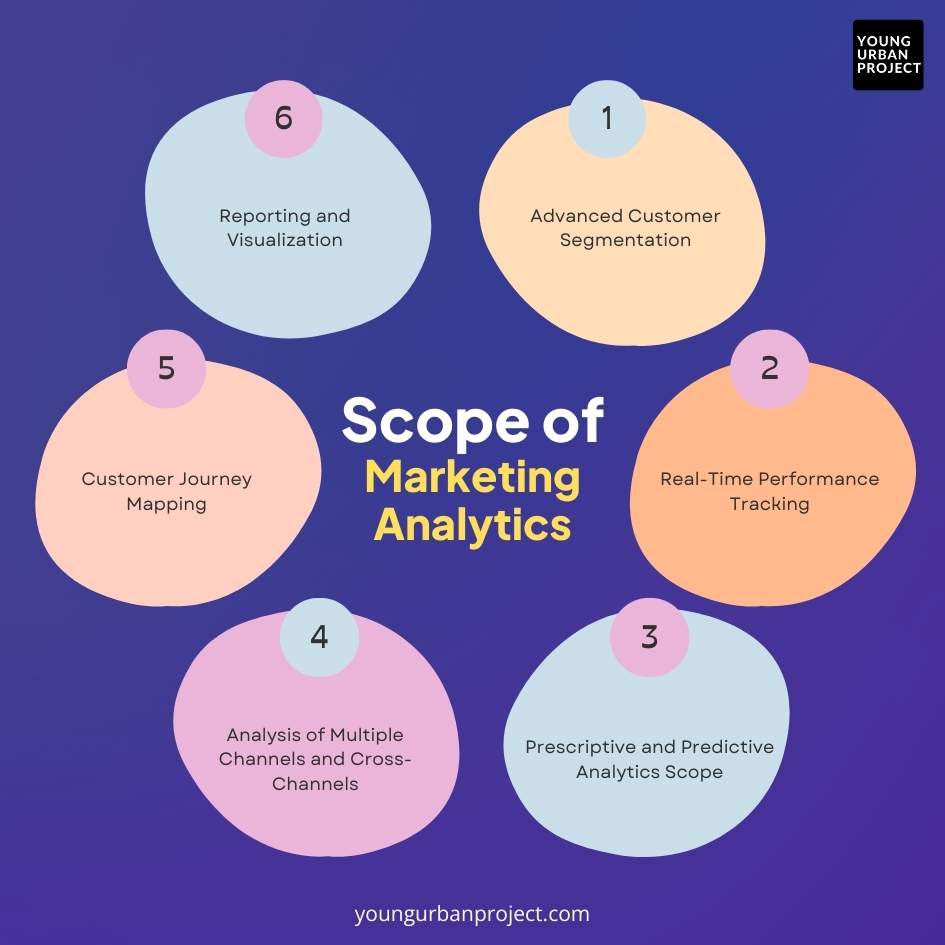Marketing analytics is important for guiding wise decision-making in the data-driven, fast-paced business world of today. Through the provision of a comprehensive analysis of diverse data sources, encompassing customer behaviour and engagement metrics, campaign performance, and market trends, marketing analytics enables organisations to make well-informed and strategic decisions.
One of the key aspects of the scope of marketing analytics is its ability to eliminate the use of intuition and guesswork, which are often biased and inaccurate. By analysing real-time data on customer interactions and sales performance, businesses can quickly identify which strategies are effective and which need adjustment. This agility allows marketers to improve campaigns, refine messaging, and allocate resources more efficiently, ensuring every marketing dollar is well-spent. Additionally, the scope of marketing analytics extends to predictive modelling, offering insights into future trends and customer behaviours.
Table of Contents
What Is Marketing Analytics?
The process of gathering, evaluating, and interpreting data on marketing initiatives in order to assess the effectiveness of marketing plans is known as marketing analytics. In essence, it functions similarly to employing a thorough map to guide your marketing initiatives and make sure you’re going in the correct way.
Consider that you are organising a road vacation. Instead of driving blindly, you would use a map to choose the best course, look for any impediments, and monitor your progress. For businesses, marketing analytics functions similarly. It involves getting information from multiple marketing platforms, including social media, email campaigns, website traffic, and sales figures, and utilising this information to determine what is and is not effective.
To put it another way, having a strong toolkit to help organisations interpret their marketing data is what marketing analytics is all about. They are able to assess the success of their marketing campaigns, make data-driven choices, and ultimately improve their performance. Businesses can improve their overall marketing effectiveness, their target audience, and optimise their tactics by comprehending and utilising marketing analytics.
Benefits Of Marketing Analytics
While the scope of marketing analytics is broad, there is a reason why it is considered so important for any business that wants to make data-driven decision. Below mentioned are some benefits that focusing on marketing analytics brings to a business.
1. Data-Driven Decision Making
Users may make well-informed decisions by utilizing the strong foundation that marketing analytics offers. Businesses can determine which marketing techniques are successful and which are not by analyzing data from a variety of campaigns and marketing platforms. This removes the need for speculation and intuition and makes it possible to make decisions that are more exact and assured. Marketers might concentrate their efforts on creating content that is similar to that, for instance, if data indicates that a specific kind of content generates better engagement and conversions.
2. Improved Targeting and Personalization
The potential of marketing analytics to improve targeting and personalization is one of its main benefits. Businesses can more precisely segment their audience and develop customised marketing messages by examining consumer behaviour and preferences. This raises the possibility of engagement and conversion by giving customers more tailored and relevant experiences. To increase sales and consumer pleasure, an online store, for example, can utilise analytics to recommend products based on past purchase history.
3. Optimised Marketing Spend
By determining which channels and campaigns provide the highest return on investment (ROI), marketing analytics assists users in more efficiently allocating their marketing budget. Businesses can optimize outcomes by reallocating their money by identifying the tactics that yield the highest returns and are most cost-effective. To improve overall marketing efficiency, businesses might adjust their budget if analytics show, for instance, that social media advertising yields a higher return on investment than traditional print ads.
4. Enhanced Campaign Performance Tracking
Users can monitor and assess campaign results in real-time with marketing data. Key performance indicators including click-through rates, conversion rates, and client acquisition expenses are monitored as part of this. Businesses can enhance results by promptly adjusting their campaigns by regularly assessing their success. To improve performance, marketers can adjust creative aspects, targeting, or language in a campaign that isn’t doing well in order to increase outcomes.
5. Better Customer Insights and Engagement
Businesses can gain significant insights into client behaviour and preferences through marketing analytics, which helps them better understand their target audience. This enhanced comprehension facilitates the development of more persuasive and pertinent marketing tactics that connect with consumers. Businesses may create more engaging marketing campaigns and forge better customer relationships by, for instance, examining customer feedback and engagement data to determine what content or offers are most enticing.
Importance of Marketing Analytics
Marketing analytics is a critical function that helps a business make better decisions with a higher chance of marketing success. Below mentioned are some reasons why marketing analytics is truly important:
1. Precision in Targeting and Personalization
Deep insights into consumer behaviour and preferences from marketing analytics give organisations the ability to target their marketing campaigns with unmatched precision. This leads to precision in personalization and targeting. Personalization is essential for drawing attention in a time when customers are inundated with advertisements. Analytics facilitates audience segmentation for firms by utilising comprehensive data, including demographics, past purchases, and browsing habits.
2. Enhanced ROI And Efficient Budget Allocation
Marketing analytics helps firms identify which marketing channels and initiatives yield the highest return on investment (ROI), leading to enhanced ROI and efficient budget allocation. Businesses may determine which channels are the most cost-effective and adjust their budget by examining performance metrics. This guarantees that marketing spend is optimised, minimising wasteful spending and maximising the return on investment for every dollar spent on marketing.
3. Benefit of Real-Time Performance Monitoring
In dynamic industry, being able to track marketing performance in real-time is essential. Instant feedback on campaign efficacy is provided by marketing analytics, which enables companies to swiftly make data-driven decisions. Because of its flexibility, marketing strategies may be adjusted on the go to keep campaigns successful and relevant for the whole time. This tracking and monitoring is a part of the scope of marketing analytics.
4. Benefit of Informed Decision-Making
Marketing analytics provides actionable insights made from data, facilitating better decision-making. Businesses can base their strategy on empirical information rather than speculation or intuition. Better forecasting and strategic planning result in improved marketing outcomes in the end.
Also Read: Biggest Performance Marketing Challenges and How to Address Them
Scope Of Marketing Analytics

1. Advanced Customer Segmentation
By analysing data to group customers based on demographics, behaviour, past purchases, and engagement levels, marketing analytics enables enhanced customer segmentation. This segmentation, which focuses on particular client characteristics and preferences, can be extremely detailed.
2. Real-Time Performance Tracking
The scope of marketing analytics includes real-time tracking of marketing campaign performance. This involves monitoring key metrics such as impressions, clicks, conversions, and customer interactions as they happen.
3. Prescriptive and Predictive Analytics Scope
Prescriptive analytics provides advice on how to accomplish desired results, whereas predictive analytics uses past data to predict future patterns and customer behaviours. These cutting-edge analytics techniques support proactive decision-making and the anticipation of future requirements.
4. Analysis of Multiple Channels and Cross-Channels
The scope of marketing analytics includes cross- and multi-channel analysis, which looks at how well marketing campaigns operate on different platforms and channels. This involves being aware of the ways in which many channels interact and support successful marketing campaigns as a whole.
5. Customer Journey Mapping
Marketing analytics entails the charting of the customer journey from the point of initial awareness to the point of final purchase and beyond. This involves looking at the several ways that consumers interact with the brand and touchpoints they encounter. The comprehension of the customer journey enables firms to pinpoint issues, maximise communication, and elevate the customer experience in its whole.
6. Reporting and Visualization
Reporting and visualisation technologies that combine data into easily understood dashboards and reports are all part of marketing analytics. These resources aid in the visually appealing presentation of findings.Marketing performance and trends are easier for stakeholders to grasp when there is effective reporting and visualisation. Reports that are easy to read and implement help improve decision-making and marketing outcome communication.

Careers In Marketing Analytics
Depending on your interest, there are various directions you can take within the field of marketing analytics. Here are few of them along with what they entail.
1. Marketing Analyst
Marketing analysts focus on evaluating marketing data to determine the effectiveness of campaigns and strategies. They gather data from various sources, analyse performance metrics, and provide actionable insights to optimise marketing efforts.
2. Business Intelligence (BI) Analyst
BI analysts concentrate on doing business data analysis to aid in making decisions. They generate dashboards and reports that offer insights into corporate performance using data visualisation tools and reporting software.
3. Marketing Strategist
The role of a marketing strategist is to create and carry out marketing plans that stimulate business expansion using data analytics. To inform strategic planning and execution, they examine consumer behaviour, market trends, and campaign results.
4. Data Analyst
The role of a data analyst involves gathering, processing, and analysing data to assist with a range of corporate operations, including marketing. Using datasets, they produce reports, spot trends, and offer insights that help in decision-making.
Proficiency in data visualisation, statistical methods, and data analysis tools are required. Effective problem-solving and analytical abilities are crucial.
5. Digital Marketing Analyst
Digital marketing analysts are responsible for examining data from digital marketing channels, including email, social media, and search engines. They monitor important metrics, evaluate the success of campaigns, and offer suggestions for enhancing digital marketing initiatives.
Proficiency in data analysis, reporting tools, and digital marketing platforms is required. It is crucial to have strong analytical abilities and a working knowledge of digital marketing metrics.
Conclusion
Marketing analytics is an essential tool for businesses aiming to succeed in this data-driven world. By offering actionable insights, enabling real-time performance tracking, and optimizing marketing strategies, analytics help companies make informed decisions, improve ROI, and create personalized customer experiences. The scope of marketing analytics extends across multiple channels, predictive modeling, and customer journey mapping, making it a crucial asset for refining marketing efforts. With diverse career opportunities, mastering marketing analytics allows professionals to drive business growth through data-based insights and innovation.
FAQs: Scope Of Marketing Analytics
How Does Marketing Analytics Help in Customer Segmentation?
Marketing analytics helps in customer segmentation by analysing data to group customers based on shared characteristics, behaviours, or preferences. By examining variables such as purchase history, demographics, and engagement levels, businesses can create targeted marketing campaigns for each segment. This improves the relevance of marketing messages and enhances the likelihood of conversion by addressing the specific needs and interests of different customer groups.
What Tools Are Commonly Used in Marketing Analytics?
Common tools used in marketing analytics include:
–Google Analytics: For tracking website performance and user behavior.
–Tableau and Power BI: For data visualization and creating interactive dashboards.
–HubSpot and Marketo: For marketing automation and analyzing campaign performance.
–Adobe Analytics: For in-depth analysis and reporting across multiple channels.
–Mixpanel: For tracking user interactions and product analytics.
How Can Marketing Analytics Improve Campaign Performance?
Marketing analytics improves campaign performance by providing insights into which elements of a campaign are effective and which are not. By analyzing data such as click-through rates, conversion rates, and customer feedback, businesses can identify areas for improvement. This allows for real-time adjustments to optimize targeting, messaging, and budget allocation, leading to more effective campaigns and higher ROI.
What Is the Difference Between Descriptive, Predictive, and Prescriptive Analytics?
–Descriptive Analytics: Analyzes historical data to understand what has happened. It involves summarizing past data and reporting on metrics to identify trends and patterns.
–Predictive Analytics: Uses historical data and statistical models to forecast future outcomes and trends. It helps in anticipating future behaviors and market conditions.
–Prescriptive Analytics: Provides recommendations for actions to optimize outcomes based on data analysis. It suggests strategies and actions to achieve desired results.
How Can Marketing Analytics Benefit Small Businesses?
For small businesses, marketing analytics provides valuable insights without requiring a large budget. It helps small businesses understand their customer base, track the effectiveness of their marketing efforts, and optimise their strategies for better results. By leveraging data, small businesses can make more informed decisions, allocate resources efficiently, and compete effectively with larger competitors.
What skills are needed for a career in marketing analytics?
Key skills include proficiency in data analysis, knowledge of marketing platforms, expertise in reporting tools, and strong problem-solving abilities. Familiarity with statistical methods and data visualization tools is also important.
Why is marketing analytics important?
Marketing analytics eliminates guesswork by providing concrete data that helps businesses make informed decisions, improve campaign performance, personalize customer interactions, and optimize budget allocation, leading to higher returns on investment.

